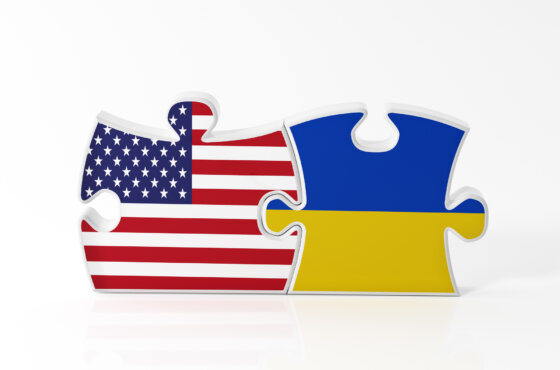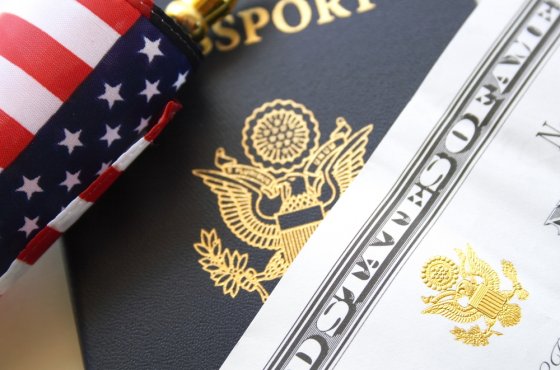How Ukraine and Hungary have quarreled over the issuance of passports
Ukraine and Hungary are on the verge of a major diplomatic scandal: Kiev declared the Hungarian consul working in the town of Beregovo, located in western Ukraine, persona non grata. He will have to leave the country. Budapest took mirror measures.

Фото: Depositphotos
Kiev’s outrage was caused by the publication on the Internet of an anonymous video about how the staff of the consulate in Beregove gave Ukrainian citizens Hungarian passports and urged them to hide their second citizenship from the Ukrainian authorities.
Over the past seven years, the second citizenship, not provided for by Ukrainian legislation, received tens of thousands of local residents.
But the current scandal is unfolding amid an unprecedented cooling of relations between Kiev and Budapest.
How to become a Hungarian
“With all my heart I don’t want Magyars to be here (Hungarians self-name). “I want the owner to be here,” says a middle-aged man who asks to be called Gregory with a tear in his voice.
We are sitting with him in a cafe on the outskirts of Uzhgorod, the regional center of the Transcarpathian region - the westernmost region of Ukraine. The hour is already late, Gregory has to get up early tomorrow and go to Warsaw on business.
One of the poorest regions of Ukraine, Transcarpathia borders on four EU member states: Romania, Hungary, Slovakia and Poland. Therefore, many local residents move around as best they can, taking advantage of the proximity of the border.
Someone fills a full tank of gas, moves to Slovakia and, after traveling a couple of kilometers from the border, sells fuel with fat.
Many teachers and nurses living near the border work in neighboring Hungarian schools and hospitals, returning to Ukraine every evening.
So Grigory smiles: he often travels to Poland on business. Tomorrow, as always, he will show the Ukrainian border guard a blue book with a trident. In the neutral zone, he will take out another passport from the glove compartment - a dark red “Utlevel” - and enter Polish territory as a Hungarian citizen.
“As a Magyar, I can work in any country in Europe without restrictions. I can live there for at least a month, at least a year. Convenient, profitable,” says Grigory.
Seven years ago, Hungary introduced the law on the simplified granting of citizenship.
Since 2011, unconvicted citizens whose ancestors were born on territory that belonged to Hungary can apply for a Hungarian passport. For example, here in Transcarpathia before 1920, or in the period 1938-1945.
In addition, they need to master the Hungarian language at a basic level.
“Here, no matter what you spit, you’ll end up as a Magyar,” Grigory explains good-naturedly.
Moreover, he adds, you can simply buy, if you wish, the Hungarian language, which opened in Uzhgorod, if you wish, for filing a passport certificate from the archive of the place of birth of your great-grandmother.
As of February 2015, the Hungarian passport was obtained by 94 by thousands of Ukrainians living in the Transcarpathian region. More recent data the Hungarian side has not yet announced.
According to Ukrainian laws, the voluntary acquisition of a second citizenship by a Ukrainian citizen leads to the loss of a Ukrainian passport. In fact, the mechanism of deprivation of citizenship is not prescribed in the law, and in general there is no penalty for holders of two passports.
Until recently, Kiev turned a blind eye to this situation. But now, it seems, everything will change.
Укrainsky passport against ulavela
On September 19, the Ukrainian state news agency Ukrinform published a video that the agency said it obtained from its own sources. The recording, apparently made with a hidden camera, depicts the final stage of the procedure for the naturalization of Ukrainian citizens into Hungarian citizenship.
A group of people repeats an oath after an employee of the Hungarian consulate in Beregovo - the border regional center of the Transcarpathian region - with the words: “I swear that I consider Hungary my homeland. I will be a loyal citizen, protect and serve Hungary."
Then the consulate employee urges the newly acquired compatriots not to advertise the presence of a Hungarian passport in front of Ukrainian state structures.
For those involved in Ukrainian-Hungarian relations, this video was hardly a revelation: everyone involved knows that the procedure for obtaining Hungarian citizenship looks like this, and the words of the oath of a citizen of Hungary have never been a secret.
“Well, yes, when I received my passport, this is roughly what it looked like. And we were also given recommendations not to advertise [the presence of a Hungarian passport]. Unless these recommendations sounded much more tolerant or something,” says Uzhgorod resident Olga, who obtained a Hungarian passport four years ago.
However, for millions of Ukrainians who are not so aware of the situation in Transcarpathia, what he saw on the record was, to put it mildly, unexpected.
The receipt by citizens of Ukraine of a passport of another state, especially in secret, evoked an association with the events in Crimea, the inhabitants of which were actively “passported” by Russia even before the annexation.
The oath of allegiance to another state, a direct instruction to keep second citizenship in secret for many citizens of the country, the fifth year of fighting against separatists in the Donbas, became a very strong stimulus.
The BBC asked the Hungarian consulate in Beregove for comment, but they forwarded the request to the Hungarian embassy in Kiev. At the time of publication of the article the answer to the request of the BBC was not received.
In the meantime, the Security Service of Ukraine opened a criminal case over the publication of a video on an article on treason, and a fierce skirmish broke out between the Ukrainian and Hungarian foreign ministries.
Ukrainian Foreign Minister Pavlo Klimkin accused the Hungarians of violating Ukrainian legislation and diplomatic etiquette.
In response, the spokesman for the Hungarian Foreign Ministry, Tamas Mentzer, called the publication of the record from the consulate the operation of the Ukrainian special services, which violated all the written and unwritten diplomatic rules.
“The problem of the scandalous video is not only the distribution of citizenship, but also the call to hide it from Ukraine,” Klimkin said.
“Dual citizenship is a common practice for the European Union, and Ukrainian objections on this matter show the frivolity of Kyiv’s intentions to integrate into the EU and NATO,” retorted his Hungarian colleague Peter Szijjártó.
Last week, the two ministers met at a meeting of the UN General Assembly in New York, but their hour-long negotiations proved fruitless.
As a result, on Thursday morning, the Ukrainian Foreign Ministry announced the Hungarian consul in Beregovo persona non grata and ordered him to leave the country within three days.
On Thursday, it became known that the Ministry of Foreign Affairs of Hungary gave the Ukrainian Consul 72 an hour to leave the Hungarian territory. The Hungarian Foreign Minister called it a proportional response to the actions of the Ukrainian authorities.
Meanwhile, Ukrainian-Hungarian tensions were developing in another plane: Peter Szijjártó was included in the database of the Ukrainian website “Peacemaker,” which publishes personal data of people whom its creators consider “separatists and agents of the Kremlin.”
The Hungarian Foreign Ministry reported that the minister’s security service took appropriate measures in connection with Szijjártó’s inclusion on the list of a “Ukrainian extremist website.”
"Stab in the back"
The scandal with the distribution of passports was not the first problematic moment in the Ukrainian-Hungarian relations in recent years. Last year, the outrage of Budapest caused the adoption by Ukraine of a new law on education, providing for a gradual transition of school education to the Ukrainian language.
And while experts said that the law was aimed primarily at Russian-speaking schools, more than 70 of Hungarian schools in Transcarpathia, in which more than 16 thousands of children study, should have come under its action.
The Minister of Education of Ukraine Liliya Grinevich then cited impressive statistics: three quarters of last year’s school graduates in the Beregovsky district, where, according to the latest census, ethnic Hungarians make up 76% of the population, during an external independent assessment (the Ukrainian analogue of the Unified State Exam) in the Ukrainian language received unsatisfactory grades - from 1 to 3 points on a 12-point scale.
“I once taught in Beregovo, at an institute opened with Hungarian money. So there, some students could not write their name in Cyrillic,” says another Hungarian passport holder, 35-year-old IT specialist Mikhail (name changed).
In Kiev, it was said that Transcarpathian graduates who, after graduating from school, do not speak the state language, have limited career opportunities and are doomed to either stop at secondary education or emigrate to Hungary.
Therefore, a new law, they say, expands the rights of minorities: after receiving education in Ukrainian, young Hungarians will be able to enroll in Ukrainian universities and apply for positions in local government.
However, the same head of the Hungarian Foreign Ministry, Peter Szijjártó, then called the adoption of the education law a “stab in the back” of Hungary and the Hungarian people, which will lead to the infringement of the rights of the Hungarian minority in Ukraine.
Budapest promised to block Ukraine’s steps towards rapprochement with the EU and NATO until the discussion of the law on education was canceled, and consistently fulfills this promise by blocking a number of meetings within the framework of Kiev’s cooperation with these organizations.
It’s no wonder that in Budapest they connected the “passport scandal” with the discussion about the language of education and accused Kyiv and Ukrainian President Petro Poroshenko personally of a deliberate anti-Hungarian policy.
“As long as Ukraine is led by the current president, the incitement of hatred towards Hungarians, inspired and led by the Ukrainian state, will not stop, because the president believes that in this way he can gain some public support, since now his level of support is very low. Elections next year can change the situation,” Peter Szijjártó said recently.
The idea that the “passport scandal” was specifically inspired by the current Ukrainian government, which, on the eve of the spring presidential elections, wants to accumulate the support of a patriotic electorate, is quite popular among Transcarpathian holders of Hungarian passports.
“Everything is clear with this video. It is clear that it was written not by an ordinary visitor to the consulate, but by the SBU (Security Service of Ukraine), and now our government is using it to show: what cool guys we are. Passports are a bone thrown to voters. In Transcarpathia they look at all this with amazement, but in the rest of the country the hype can be raised,” says IT specialist Mikhail.
The SBU did not comment on the allegations about the involvement of the security services in the appearance of the video. Petro Poroshenko has not yet announced his participation or non-participation in the presidential election 2019 of the year.
"Russian trace"
On the streets of 25-thousand, Beregov does not feel at all that this is where the epicenter of the diplomatic confrontation between Kiev and Budapest is located.
According to the Transcarpathian regional administration, ethnic Hungarians make up about half of the town’s population.
The signs here are duplicated in two languages, exchangers accept Hungarian forints without any problems, the flags of Ukraine, the European Union and Hungary are adjacent to the city council building, and, judging by the signs inviting passers-by to small street cafes, gyros - a Hungarian fast food dish - is much easier to find here than , for example, Ukrainian borscht.
A middle-aged woman who briskly trades groceries at the local bazaar, communicating with several customers simultaneously in Ukrainian, Russian and Hungarian.
“I don’t understand why they are jumping on the Hungarians in Kyiv. They have nothing to do. They distract people’s attention from the fact that gas will soon be worth as much as gold. But the Hungarians only need to say thank you: if it weren’t for them, there would be no roads, no hospitals, no schools. Kyiv doesn’t care about us,” she says.
The Transcarpathian administration admits: Uzhgorod is the most distant regional center of the country from Kyiv, from here to the capital of Ukraine is further than to Budapest, Warsaw and even Vienna, and often the region receives less attention from Kyiv than we would like. It happens that in critical situations Transcarpathia turns to its neighbors for help and receives it.
It was Hungary that helped Transcarpathia with chlorine to disinfect water, when the only enterprise producing it stopped in Ukraine. Vaccines, scarce drugs and serums for rabies or viper bites come to the region from the same place, says the deputy head of the regional administration, Yaroslav Galas.
“Of course, the scale of assistance to the region from Kyiv and Budapest is incomparable. But the Hungarians are very active in advertising their help,” he says.
This assistance in combination with simplified distribution of passports, grant programs for farmers and small entrepreneurs of Hungarian origin, educational programs for young people and investments in border infrastructure form the local population the impression that Transcarpathia needs Hungary more than Ukraine. And this is already becoming a problem, some say.
“In Kyiv they paid close attention to Transcarpathia after the annexation of Crimea and the start of the war in Donbass, when it became clear that if some region is calm, this does not mean that they support Ukraine. After 2014, Kyiv began to value loyalty to the Ukrainian state—not even to the Ukrainian government. In this sense, Transcarpathia is in a risk zone, and Russia has tried to use it as a platform for provocations,” says a BBC source close to the Ukrainian government, who is not authorized to publicly comment on this topic.
The BBC's interlocutor is referring to two arson attacks on the Uzhgorod office of the Union of Transcarpathian Hungarians, which occurred in February of this year. The organizer of one of them, the governor of Transcarpathia Gennady Moskal, named an employee of the MGB of the unrecognized Transnistria; the suspects in the second were detained in Poland - they turned out to be activists of the local nationalist organization “Phalanx”. In Kyiv then they talked about the “Russian trace” of both provocations.
In Moscow, they stated that no one believes the statements of representatives of the Ukrainian authorities about the involvement of the Russian side in arson.
“Orban, send in the troops!”
Hungarian activity is alarming not only, perhaps far from the local realities of Kiev.
“I am pleased to see how my hometown is becoming prettier before our eyes, becoming truly European for Hungarian money, but remember: “Don’t trust the Danaans who bring gifts”? I don't believe them. As a nationalist, I understand that they are doing everything right, they are expanding the sphere of influence of their nation. But as a Ukrainian, I can’t calmly look at this,” says Vasily Vovkunovich, a colorful bald man who is about 60 years old.
In the local right-wing crowd, Vovkunovich is called the island of Ukraine in the middle of the Hungarian Sea: he heads the cell of the nationalist party “Svoboda” in Beregovo.
“Everything that the Hungarians do, they accompany with a message: we give you, but what did Ukraine give you? They are shaking the foundations of the state, sowing distrust in it, turning Ukrainians into “Hungarians by orientation,” he says emotionally.
“Svobodovets” took part in the elections of the mayor of Beregov with the slogan “From the Ukrainians - Vovkunovich!” - without much success. From time to time, he and his comrades, including from other cities of Transcarpathia, picket the Hungarian consulate or hold torchlight marches, during which they chant: “Remember, a stranger, the owner here is Ukrainian!”
“But I don’t consider the local Magyars to be strangers, they are citizens of Ukraine just like us. I’m generally a Magyarophile, my son-in-law is Magyar, I love their songs very much. But I am against the politics of Budapest. And if anyone takes this slogan personally, then that’s their problem, the thief’s cap is on fire,” says Vovkunovich.
Another activist of the local nationalist movement, 32-year-old Tomash Lelekach from Uzhgorod recognizes: among his friends there are quite a lot of newly-minted citizens of Hungary. Almost everyone made passports in order to work beyond the western border.
“I understand them: they didn’t get a passport because of a good life, and our government is to blame for this, which does not give them the opportunity to earn a decent living here. But I still consider them traitors,” he says.
“Sometimes I troll them: when will you start gathering in the square shouting “Orban (Hungarian Prime Minister), send in the troops!”? But, seriously, most of them don’t give a damn whether Ukraine or Hungary will be here, as long as there are potatoes,” Lelekac continues.
Soldiers in Beregove
Of course, no one is going to appeal to Viktor Orban with the call to send troops into the territory of Ukraine.
“Are we talking about separatism? Based on the fact that Hungary is a member of the EU and NATO, of course, the threat of forceful border changes is unrealistic. But Budapest’s goal may be different - to establish control over this region by hybrid means, without including it in its state,” says a BBC interlocutor close to the Ukrainian government.
The deputy head of the Transcarpathian Administration, Yaroslav Galas, is convinced that there is no basis for Hungarian separatism in the region, and even ethnic Hungarians here are Ukrainian patriots. He, they say, who wanted to live in Hungary, has long gone there.
Among the 95 residents of Transcarpathia who died during the fighting in eastern Ukraine, 11 bore Hungarian surnames. Based on local realities, they probably had Hungarian passports, could have avoided service in the Donbass, waited out the “special period” abroad, Galas continues, but they did not do this.
At the other extreme are the arguments of the nationalist Tomas Lelekacs.
“Ukraine is like a wounded beast in the middle of the forest, which with its last strength is fighting off another beast, Russia. And Hungary is a vulture that sits on a tree nearby and watches what is happening with interest. They won’t get into a fight, but if Ukraine doesn’t survive, they’ll tear off their piece,” he says.
Budapest never declared territorial claims to Ukraine.
However, in the spring of this year, the Ukrainian General Staff announced plans to restore the military unit of the Soviet times in Beregovo by the end of 2019 and to place military personnel there on a permanent basis 800-1000.
This initiative caused a protest from the Minister of Internal Affairs of Hungary Peter Siyarto.
“This means that they consider the Hungarian national community to be a threat to Kyiv, which is outrageous and is why Hungary categorically rejects it,” he said.
The General Staff of the Armed Forces of Ukraine did not respond to a request from the BBC about justifying such plans, but sources in the Ukrainian government say that restoring a part could at least revitalize the town’s economy.
“The image aspect is important here. We now have a renewed army, we are proud of it. And when stately soldiers and officers with blue and yellow chevrons start walking around Beregove, this will clearly help improve the reputation of Ukraine,” says Tomas Lelekac.
What to do with passports?
Be that as it may, official Kiev blames the Hungarian government for not wanting to solve problems in bilateral relations in a constructive way.
“Their position is this: we need to return to the status quo that existed before 2014 - that is, repeal the language law and turn a blind eye to their distribution of passports. But this status quo was based on the failure of our state, so returning to it is impossible,” says a BBC source close to the Ukrainian government.
However, they say in Kyiv, no matter how this episode of the conflict between Ukraine and Hungary ends, the current “passport scandal” can and should provoke a discussion about Ukraine’s attitude towards dual citizenship.
An open secret is the fact of obtaining Romanian citizenship by thousands of Transcarpathian and neighboring Chernivtsi regions. Thousands of Ukrainians who emigrated from the country over the past years, acquired second citizenship, while not handing over a passport with a trident.
The former governor of the Dnepropetrovsk region and one of the richest citizens of Ukraine, Igor Kolomoisky, in response to a question whether he was violating the law prohibiting dual citizenship, joked: of course, he doesn’t violate it - after all, he has not dual, but triple citizenship.
BBC sources in the presidential administration say that at the highest levels of the Ukrainian government the possibility of allowing dual citizenship with certain countries is being discussed - for example, with members of the EU and NATO, which Ukraine is seeking to join.
However, political scientist Dmitry Tuzhansky believes that the worst thing Kyiv can do in this situation is to begin solving the problem of dual citizenship during the hot election period.
There are other rumors circulating at the market in Beregovo - that they will soon be sent to prison for two years for possessing two passports. Perhaps this is why no one, neither sellers nor buyers, is eager to communicate on the topic of passports. However, it is very difficult to imagine that criminal cases will be opened against tens of thousands of people at once.
Therefore, most likely, in the near future the situation with dual citizenship in Ukraine will remain at the present point: it will be illegal, as it were, but no one will be punished for it.
In a cafe on the outskirts of Uzhgorod, I discuss this situation with Grigory.
I ask if he has any remorse because he clearly violates the legislation of Ukraine.
“Does our state have no remorse for the fact that I can’t earn a decent living here, and in a couple of years I’ll get a pension of 1000 hryvnia (about $35)?” he answers the question with a question.
He pauses for a while, and we say goodbye: it is late and he is too early to go to Warsaw tomorrow. According to the Hungarian passport.
Read also on ForumDaily:
7 things worth knowing about the Schengen visa
October 3 launched the Green Card Lottery: what to do
How to fill in the form on the green card: detailed instructions
Live like Putin: life hack book has been published by the president of Russia
A popular Russian channel showed a map of the division of Ukraine. VIDEO
Instruction: how and where to get a US visa
Subscribe to ForumDaily on Google NewsDo you want more important and interesting news about life in the USA and immigration to America? — support us donate! Also subscribe to our page Facebook. Select the “Priority in display” option and read us first. Also, don't forget to subscribe to our РєР ° РЅР ° Р »РІ Telegram and Instagram- there is a lot of interesting things there. And join thousands of readers ForumDaily New York — there you will find a lot of interesting and positive information about life in the metropolis.
-
Pros and cons of political asylum in the United States12868
-
Five dangerous mistakes when applying for a green card due to marriage4147
-
15 amazing professions you might not know about1313
-
A way to save in Target, which many do not know1034
-
What you need to know before you go on your first cruise812
-
Breathtaking: Must-Have Places in Southern California467
-
How to Fly Free: 10 Tips385
-
Pros and cons of political asylum in the United States12868
-
Personal experience: who and why you should not move to the USA5614
-
Where in the USA to buy the medicines we are used to: a list of pharmacies5330
-
50 diseases whose presence will increase the cost of health insurance in the USA4329
-
Five dangerous mistakes when applying for a green card due to marriage4147
-
Street, avenue, boulevard or drive: how to understand the classification of US streets and roads1461
-
Personal experience: what not to do in America1402











